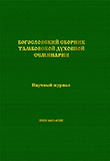От filioque до преподобного Амвросия Оптинского и дальше
Ключевые слова:
старец, сотериология, filioque, конфессия, начальный этап секуляризации, кризис веры, духовное устроение сердца.Аннотация
Статья посвящена одному из феноменов в осмыслении роли и значения старчества в лице преподобного Амвросия Оптинского, который духовным опытом помогает людям, испытывающим проблемы с принятием, осознанием веры или ее утратой, вернуться к православной жизни и духовному устроению сердца, продолжая по-прежнему оставаться при исполнении своего профессионального долга в обстоятельствах светской жизни. Автор совершает схематический экскурс в историю Церкви, подчеркивая особенности трех христианских конфессий: в частности, рассматриваются особенности их сотериологии, причины изменений, приводящих к утрате покаяния и духовной жизни, к заботе только о мирской деятельности, а следовательно, к утрате веры, духовному разладу и кризису личности. В результате трансформация католицизма и протестантства все дальше отступающих от православного вероучения находит отражение в культуре. XXI век по-прежнему нуждается в православном опыте новых старцев, понимающих тонкости духовного делания и обладающих духовно-интеллектуальной зоркостью в решении вопросов людей, живущих в эпоху постмодерна.
Скачивания
Библиографические ссылки
1. См.: Лосский В.Н. Оптинские старцы. Джорданвиль, 1995.
2. Сциентизм (от лат. scientia - знание, наука) - идейная позиция, в основе которой лежит представление о научном, прежде всего физико-математическом знании и его технической машинерии как о наивысшей культурной ценности, определяющих развития человека в современном мире.
3. Существует тесная связь данного феномена с прелестью. «Мечтания есть как бы мост для бесов...». См.: Каллист Тиликуда. О безмолвничестской жизни // Добротолю-бие : в 5 т. М., 2010. Т. 5. С. 383.
4. Аскетика - раздел православного богословия, предметом которого является изучение процесса возрождения, исцеления падшей человеческой природы в ходе христианского подвижничества - молитвенно-покаянной жизни.
5. Ересь filioque осуждена на IV Константинопольском Соборе в 879-880 гг., а также на II Лионском соборе в 1274 г.
6. Монергизм - концепция лютеранской и особенно кальвинистской сотериологии, согласно которой человек спасается только действием благодати от Бога и не принимает участия в своем спасении; в кальвинистском учении монергизм приводит к отрицанию свободы воли человека; противоположен православной синергии. Учение о монергизме восходит к Августину Блаженному.
7. Речь идет о принципе «деятельного понимания» - установке православной эпистемологии на понимание духовного, причем рассуждения и теоретизирование носит лишь вспомогательный характер. См.: Хоружий С.С. Подвиг как органон : организация и герменевтика опыта в исихастской традиции // Вопр. философии. 1998. № 3. С. 73.
8. «Сущностно-энергийный» дискурс - это способ или метод строгого логического мышления в православном богословии с позиции онтологии категории сущности и ее проявления - энергии. Противоположна католическому эссенциальному дискурсу, где нет категории энергии.
9. Тропарь преподобному Амвросию Оптинскому.
REFERENCES
1. See: Lossky V.N. Optina Elders. Jordanville, 1995.
2. Scientism (from Latin scientia - knowledge, science) is an ideological position based on the idea of scientific, primarily physical and mathematical knowledge and its technical machinery as the highest cultural value that determines human development in the modern world.
3. There is a close connection between this phenomenon and delusion. "Dreams are like a bridge for demons..." See: Kallistos Tilikuda. On the silent life // Dobrotolyubie: in 5 volumes. Moscow, 2010. Vol. 5. P. 383.
4. Asceticism is a section of Orthodox theology, the subject of which is the study of the process of rebirth, healing of fallen human nature in the course of Christian asceticism - a prayerful and penitential life.
5. The heresy filioque was condemned at the IV Council of Constantinople in 879-880, as well as at the II Council of Lyons in 1274.
6. Monergism is a concept of Lutheran and especially Calvinist soteriology, according to which a person is saved only by the action of grace from God and does not take part in his own salvation; in Calvinist teaching, monergism leads to the denial of human free will; opposite to Orthodox synergy. The doctrine of monergism goes back to Augustine of Hippo.
7. We are talking about the principle of "active understanding" - the attitude of Orthodox epistemology towards understanding the spiritual, where reasoning and theorizing are only auxiliary. See: Khoruzhy S.S. Feat as an organon: organization and hermeneutics of experience in the hesychastic tradition // Vopros. filosofii. 1998. No. 3. P. 73.
8. "Essential-energetic" discourse is a way or method of strict logical thinking in Orthodox theology from the position of the ontology of the category of essence and its manifestation - energy. Opposite to the Catholic essential discourse, where there is no category of energy.
9. Troparion to St. Ambrose of Optina.
Загрузки
Опубликован
Выпуск
Раздел
Категории
Лицензия
Copyright (c) 2024 Богословский сборник Тамбовской духовной семинарии

Это произведение доступно по лицензии Creative Commons «Attribution-ShareAlike» («Атрибуция — На тех же условиях») 4.0 Всемирная.

